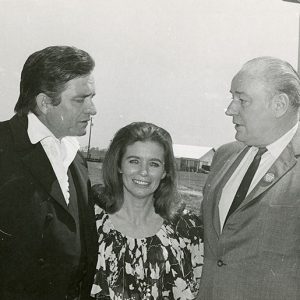calsfoundation@cals.org
Johnny Cash’s Cummins Concert of 1969
On April 10, 1969, Johnny Cash played what would be his only concert for prisoners at Cummins Unit (Lincoln County). The concert was held during Winthrop Rockefeller’s ongoing campaign for prison reform, which the governor had made a central component of his political platform since 1966. While Cummins had just begun to see noticeable positive changes, Cash’s appearance brought attention to the plight of inmates and gave Rockefeller good publicity as he sought to overhaul the management of the corrupt and violent prison farms.
Cash and Rockefeller knew each other well. In 1968, Cash had played a handful of summer and fall concerts in Arkansas during Rockefeller’s reelection campaign. By then, Cash had released his seminal At Folsom Prison album, and he was in the middle of a career comeback. Cash had agreed to play for Rockefeller in return for the governor helping to clean up the prisons in Arkansas.
When Cash played Cummins, he was just about to release another blockbuster live prison album, At San Quentin. Cash intended to broadcast the Cummins concert on his ABC variety show later in the year, but the show apparently never aired nationally, though it was broadcast on stations in Arkansas. Footage of the concert is hard to find, as it was never officially released.
On the day of the concert, Cash played for roughly 800 prisoners—men and women, white and African American. Cash mingled with the inmates, including those on death row. While on stage, Cash was given an honorary life sentence by prisoner Wade Eaves, the editor of the uncensored Cummins paper the Pea Pickers Picayune.
Cash wrote a song for the concert, “When I Get Out of Cummins.” It included the following lines:
When I get out of Cummins,
I’m goin’ up to Little Rock.
I’m gonna walk right up those Capitol steps,
And I ain’t gonna even knock.
And if the legislature’s in session,
There’s some things I’m gonna say.
And I’m gonna say, gentlemen . . .
You say you’re tryin’ to rehabilitate us,
Then show us you are.
Under a blue sky and with temperatures in the 70s, Cash performed along with the Tennessee Three—Marshall Grant on bass, W. S. Holland on drums, and Arkansas native Bob Wootton on lead guitar. Also with him that day were June Carter and the Carter family, and Carl Perkins. The Statler Brothers also appeared. Governor Rockefeller made a speech at one point during the performances. Robert Sarver, who headed the Department of Corrections, also attended.
Cash used the occasion to donate to the construction of prison chapels at Cummins and Tucker. The building of the Tucker chapel was near completion and opened a few months later. The Cummins chapel was still in the development stages and would not be finished until 1977. Cash donated $5,000 to each project.
Cash’s donation to the chapel at Cummins was appreciated by inmates. But Cash’s presence alone was enough to thrill them, as evidenced by the Pea Pickers Picayune: “The special show here today has the population more than excited—it has virtually flipped! Imagine! The one and only—the great Johnny Cash bringing his show here to Cummins!” It was the only time Cash visited Cummins. And it would be many years before Cummins was considered a prison that conformed to national standards.
The show, nevertheless, represented a highlight of Rockefeller’s second term in office, which had few bright spots. It was also one of Cash’s more memorable concerts in his home state. Despite Cash’s visit to Cummins, Arkansas had a long way to go before it had made its prisons modern and humane.
In early 1970, the Holt v. Sarver decision declared the state’s entire prison system unconstitutional. Rockefeller ran for reelection in the fall, but he was soundly defeated by Democrat Dale Bumpers, who brought in Terrell Don Hutto to run the Department of Corrections. It was not until 1982 that the prisons were compliant with federal law. By then, Arkansas had made great strides in prison reform, but it also saw a ballooning inmate population. As for Cash, he played his last prison concert in 1980, at Angola in Louisiana.
For additional information:
Dearmore, Tom. “First Angry Man of Country Singers.” New York Times, September 21, 1969, pp. 33–39, 42, 49, 55–58.
“Johnny Cash at Cummins Prison; Performs with June Carter Cash, the Carter Family, the Statler Brothers, and Carl Perkins; Film by Casey 1969.” David and Barbara Pryor Center for Arkansas Oral and Visual History (accessed April 16, 2021).
Winthrop Rockefeller Collection. Center for Arkansas History and Culture, University of Arkansas at Little Rock.
Woodward, Colin. “‘There’s a Lot of Things that Need Changin’’: Johnny Cash, Winthrop Rockefeller, and Prison Reform in Arkansas.” Arkansas Historical Quarterly 79 (Spring 2020): 40–58.
Colin E. Woodward
Hampden-Sydney College
 Civil Rights and Social Change
Civil Rights and Social Change Divergent Prosperity and the Arc of Reform, 1968–2022
Divergent Prosperity and the Arc of Reform, 1968–2022 Johnny Cash at Cummins
Johnny Cash at Cummins 




Comments
No comments on this entry yet.